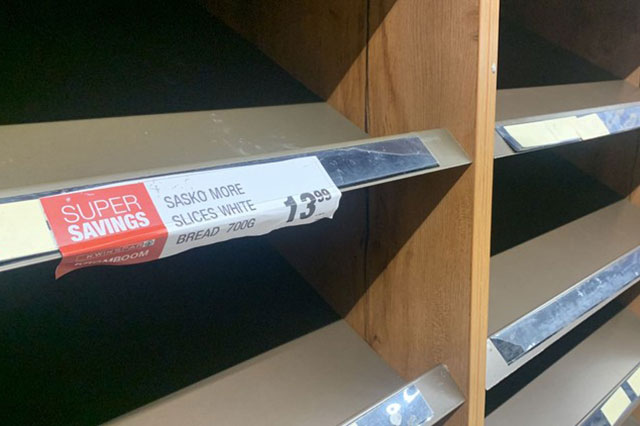This is an increasingly common sight in shops across Cape Town as the taxi strike continues. Photo: Ashraf Hendricks
By Sandiso Phaliso
GroundUp
Cape Town townships, like Philippi, are short of essentials, as shops run out of bread, milk, eggs and paraffin. Prices of daily necessities have skyrocketed in some stores. It is becoming hard to find fruit and vegetables because stores selling these have run out or closed.
This is due to the taxi strike and the shutdown that the industry is trying to enforce.
On Thursday many spaza shops in Philippi did not open because store managers were scared after being threatened.
Meat is also running out and spaza shops with stock have increased prices by at least 20%.
The price of paraffin has increased from R20 to R30 per litre. The price of eggs has increased from R2.50 an egg to R3. A litre of milk, usually R13, is now typically sold for R20. Even before bread ran out, at least one spaza shop in Philippi sold a loaf for R30 two days ago instead of the usual R18.
“People are panicking. There are empty shelves. The impact of the taxi shutdown is being felt in the townships,” a Philippi shopkeeper told us. “There is nothing as you can see. Bakeries are no longer distributing bread because it is not safe in the townships. We drive to their businesses, but it is not safe because our lives are at risk.”
He said that two days ago he tried to hire a bakkie to get to the bakeries, so he had to push up his bread prices “but people cannot afford” it, he explained.
Consequently, he has stopped stocking bread.
“We will wait and see what happens this weekend and then take a decision on what we do,” said the shopkeeper.
He said he used to sell a litre of milk for R13 but now it was R20.
Paraffin remains readily available, but you have to stand in long queues to get it.
Lungi Stofile, a Philippi resident, said the increase in prices of essential foods is difficult for those who use paraffin for cooking, lighting, and especially heating. “People already don’t have money and now these increases,” she lamented. “How are we expected to survive?”
She pointed out that this is made worse by the fact that people cannot go to work or open their small businesses.
Shopkeepers have been threatened if they don’t close their shops. One shopkeeper said: “We have to obey that instruction because if we don’t close people might come and destroy the shop and we lose stock.”
“We have not opened for the day and I hear there are other shops that have not opened as well. We will assess the situation and see what we do over the weekend,” he said.
A resident, Thembalethu Rojana, said: “The Somali owned shops are all we have, should they all close we are doomed because the shopping malls and centres are closed because of the strike. We depend on the Somali-owned spaza shops for almost everything. Few are open today and I hear there were guys going around asking them to close.”
Gift of the Givers intervenes
Renowned relief organisation Gift of the Givers said earlier on Thursday that it is intervening to alleviate hunger due to the taxi strike.
“Gift of the Givers have hundreds of soup kitchens operating in the Western Cape,” the organisation said. “The taxi unrest in the WC exacerbates an already challenging situation in terms of hunger, loss of income, unemployment, criminal activity and fear; a peaceful, pragmatic, rational solution is in the best interests of local communities, the Western Cape and the country as a whole.”
The organisation said that KFC, The Noodle Factory, Wholesum Foods, Woolworths and Sasko “have been magnificent in their consistent support to feed our hungry communities”.
Follow African Insider on Facebook, Twitter and Instagram
Picture: GroundUp
For more African news, visit Africaninsider.com


